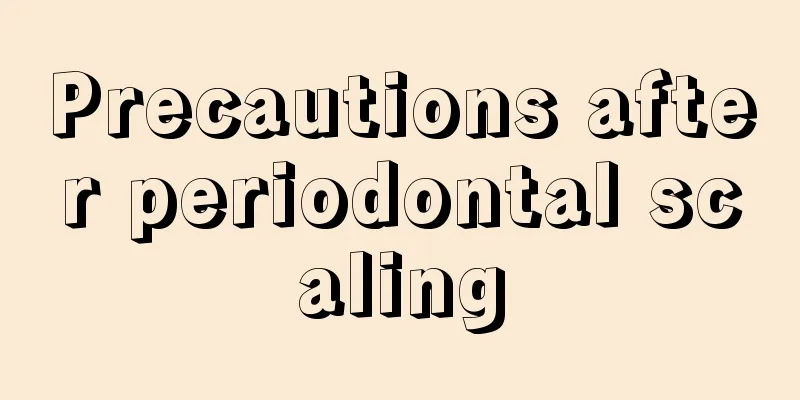Precautions after periodontal scaling

|
Periodontal scaling is treated by subgingival scaling. This deep teeth cleaning method can effectively remove dental plaque and has a very good effect on the treatment of periodontitis and gingivitis. Subgingival scaling is not very complicated, but considering that teeth are used frequently, we must pay attention to some details to avoid affecting our teeth. So, what are the precautions after periodontal scaling? Let’s take a look below. Subgingival scaling is a procedure that uses a relatively fine subgingival scaler to scrape away tartar and plaque on the root surface in the periodontal pocket. The main pathogenic factors of periodontitis are tartar and plaque attached to the surface of tooth roots. We usually use subgingival scaling, which is commonly known as "deep cleaning" to remove deep dental plaque. Root planing is the continuation and improvement of subgingival scaling. Because tartar plaque is widely distributed and invisible to the naked eye, it is impossible for doctors to completely remove it during clinical operations, and a certain amount of tartar is often missed. Therefore, after subgingival scaling, doctors use a fine subgingival scaler to sense and scrape away the diseased tissue and scattered tartar plaque on the root surface by hand, making the root surface smooth, which is conducive to the re-attachment of the gums to the root surface and the disappearance of periodontal pockets. Currently, periodontal pocket endoscopes can also be used to assist in the operation. Indications Gingivitis, periodontitis Scaling is the most basic treatment for various periodontal diseases, and subgingival scaling and root planing is one of the steps. Preventive treatment Regular cleaning is performed during periodontal maintenance to remove plaque and tartar in order to maintain periodontal health in the long term and prevent the occurrence and recurrence of periodontal diseases. Preparation for other oral treatments For those with more tartar, cleaning should be performed before taking the impression for restoration to eliminate gingival inflammation and facilitate the accurate production of the restoration. Some major oral surgeries require cleaning before they occur to eliminate the risk of infection and transient bacteremia. Cleaning is also required before and during orthodontic treatment to eliminate existing gingivitis or prevent the occurrence of gingivitis. Postoperative precautions ① If there is a lot of bleeding during subgingival curettage, antibiotics can be used appropriately to prevent infection or periodontal plugs can be applied locally for 4 to 6 days after the operation. ② Instruct patients to use the correct toothbrushing method, pay attention to oral hygiene, and follow up regularly in the outpatient clinic. |
<<: Thoracic vertebra hyperplasia causes back pain
>>: Manifestations of male chauvinism
Recommend
How to get rid of fleas on your body
I don’t know if you have seen fleas in your life....
How to clean belly button_How to clean belly button
The navel is the only place on the body that can ...
How to make Philippine vegetable and meat dumplings
Dumplings are one of the people's favorite fo...
Does the early cure rate of cervical cancer affect life expectancy?
The cause of cervical cancer is very clear, mainl...
Making tea with snow chrysanthemum and wolfberry is simple and nutritious
Snow chrysanthemum has many benefits. It is very ...
Descaling an electric kettle
As people's quality of life is constantly imp...
Can I take a hot spring bath on a rainy day?
Some friends think that it is not suitable to tak...
What are the clinical manifestations of cardiovascular neurosis
Cardiac neurosis is a syndrome centered around so...
Is fumigation effective in treating ichthyosis
If you want to treat ichthyosis scientifically, y...
Are there any sequelae after chemotherapy for brain cancer?
In recent years, the number of patients with brai...
Why do pimples appear on the face?
The phenomenon of acne is a very normal symptom i...
How can I completely get rid of leg hair?
Summer is getting closer. In order to be able to ...
What are the methods to remove forehead wrinkles?
The corners of the eyes and forehead are the firs...
Patients with hamartoma should eat a light diet
Our usual attention to diet can be directly relat...
Is breast cancer metastasis to lymph nodes good?
Is it good for breast cancer to metastasize to th...









